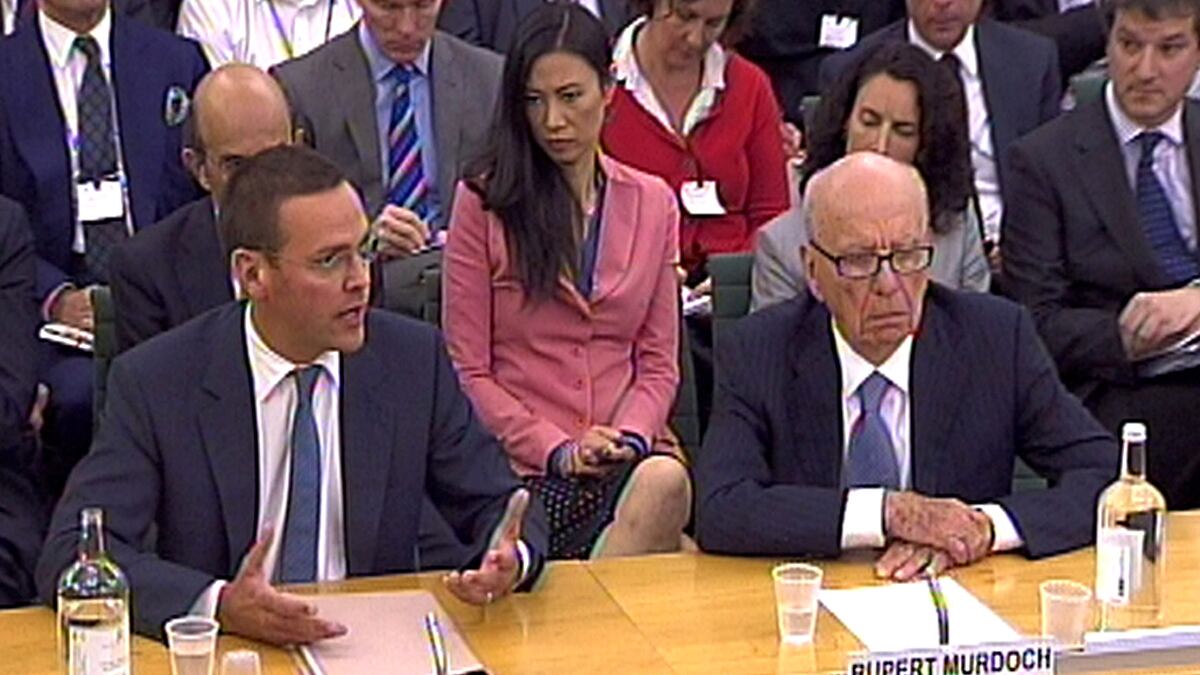Rupert Murdoch has had a good few days: with the eyes of the world turning to the American debt crisis, the glare of the spotlight has been focused elsewhere. That reprieve is coming to an end: hot on the heels of the Sara Payne hacking bombshell comes news that Stuart Kuttner, former managing editor of the News of the World, has been arrested on suspicion of conspiring to intercept communications.
As evidence that hacking was widespread continues to mount, Murdoch and his son James, the head of News International, have clung to the increasingly tattered defense that illegal activity was restricted to a few bad apples, while insisting repeatedly that News Corp.’s code of conduct was a model of responsibility that should have prevented such appalling infractions.
But business ethicists say it’s actually the reverse: a lax, poorly worded, photo-bloated code may actually have contributed to an atmosphere of lawlessness in the corridors of the News of the World—and perhaps other News International papers as well. “[The code has] boilerplate kind of language, nice pictures, comprehensiveness in terms of all the businesses inside Murdoch’s empire, but when we get down to it, it’s pretty basic: you need to follow the rules and ask if you don’t know,” says Jennifer Chatman, a distinguished professor of management at the University of California—Berkeley’s Haas School of Business. “But it doesn’t say, ‘You are responsible for thinking through judgments that may be important down the line.’ If it becomes a substitute for individual employees thinking through these, you’re in trouble.”
Where does the code go wrong? Here are five key weaknesses. (You can follow along at home with the full text here in PDF form.)

1. Keep It Short.
The News Corp. code weighs in at a Proustian 56 pages. Sure, much of that consists of snazzy photos of enthusiastic, happy employees going about their daily business, but such a large document can drive off even a conscientious employee. It’s generally accepted that companies should make their codes the shortest length in which it’s possible to fit all the essentials. And it’s not just so people read through the whole thing. “I imagine people stopping at page 3,” Chatman says, adding that the length could be problematic even if they soldiered on: “What does it reflect that an organization needs such a bulk code? May there be inconsistencies between what it’s trying to say and what’s actually going on? Are we hiring people who wouldn’t know this anyway?”
2.Tell Employees How to Think, Not What Not to Do.
Corporate codes, once a hallmark of the most responsible companies, have become at once more common and less meaningful, says Kirk Hanson, who directs the Markkula Center for Applied Ethics at Santa Clara University. Many companies have adopted codes specifically for instances such as lwhat News Corp. faces now—so executives can point at them and then wash their own hands.
“This is a compliance document without an inspirational set of values,” Hanson says. “The only value statement that it looks like is in this document is, ‘We treat each other fairly and with respect, establishing a high trust environment where people can do their best work.’ That’s totally inadequate. That doesn’t say anything.”
For years, Hanson says, Johnson & Johnson’s “Credo” was a model—instead of just proscribing certain activities, it was a positive statement of the company’s values. Successful codes offer an informal set of moral guidelines. With a long and proscriptive document, things get dicier. “It causes employees to substitute this document for thinking for themselves,” Chatman says. “It the specific decision is not explicitly listed in the formal document, it’s not clear what people should do about it.” News Corp.’s code namechecks wiretapping, but it doesn’t say anything about hacking voicemail or receiving transcripts from investigators—so a reporter might have been lulled into believing it was OK.
3. Stay Specific.
By any standard, News Corp. is a behemoth. It has thousands of employees on six continents in businesses from book publishing to news to movie-making to music. “[The code] has got to be made more explicit about what it means in the thousands of different jobs that exist within the News Corp. empire,” Hanson says. “There’s no evidence here that they had serious discussions about what it means in different kinds of media or different media projects.” A News Corp. spokesman said some units have their own standards, although the corporate code preempts them. But some of the subsidiaries have codes that are more exemplary. Dow Jones, which publishes the Wall Street Journal, maintains a code that’s a taut four pages long, begins with a strong statement of values, and then proceeds to lay out in clear terms what they mean (for example, where a financial conflict of interest might occur and how to avoid it).
4. Make the Document Real.
It’s not enough for Human Resources to send employees the code of conduct once a year—but that’s exactly how many companies check the box. Pressed by Therese Coffey, a member of Parliament, James Murdoch was vague about how the company guarantees awareness, mentioning workshops conducted by company lawyers. That’s a start, but not enough on its own, Hanson says. “Does it come alive? Are there efforts to make this more than a document that everybody tosses in the back of the drawer?” he asks. “Workshops are a standard practice, but that could be lawyers standing up and droning on, or it can be, ‘Let’s talk about this code and what it means for your job.’”
5. Make Sure Managers Live the Code.
How employees actually use the code is far more important than what’s in it, experts say. If reporters at the News of the World came to work every day and saw colleagues using hacked voicemails to get scoops, they would have been lulled into a sense of complacency about the practice. And if they saw their colleagues getting ahead, they would have been driven to take it up themselves. “If I’m rewarded for getting the story no matter what, I will get the story, no matter what. If you reward people for getting the story at any cost, they will take risks like tapping phones,” Hanson says. “My impression is News Corporation has encouraged an edginess amongst its journalists and editors, and in this case it’s come back to haunt them.”





